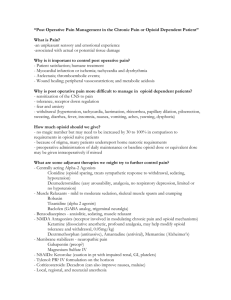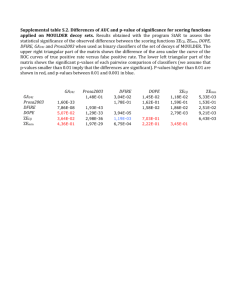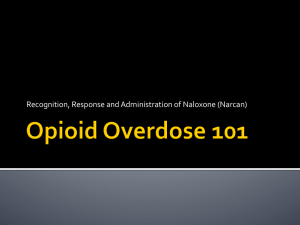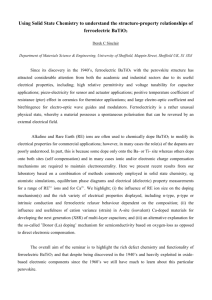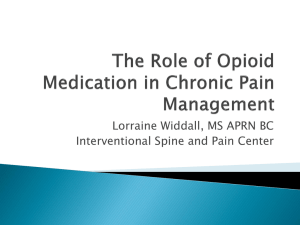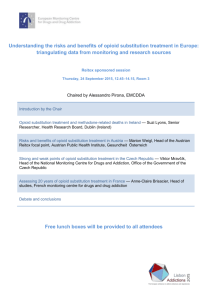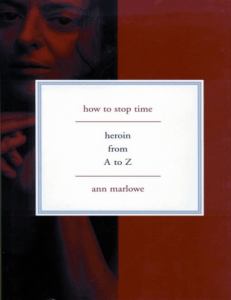Interview with an opioid addict Interview with an opioid addict
advertisement
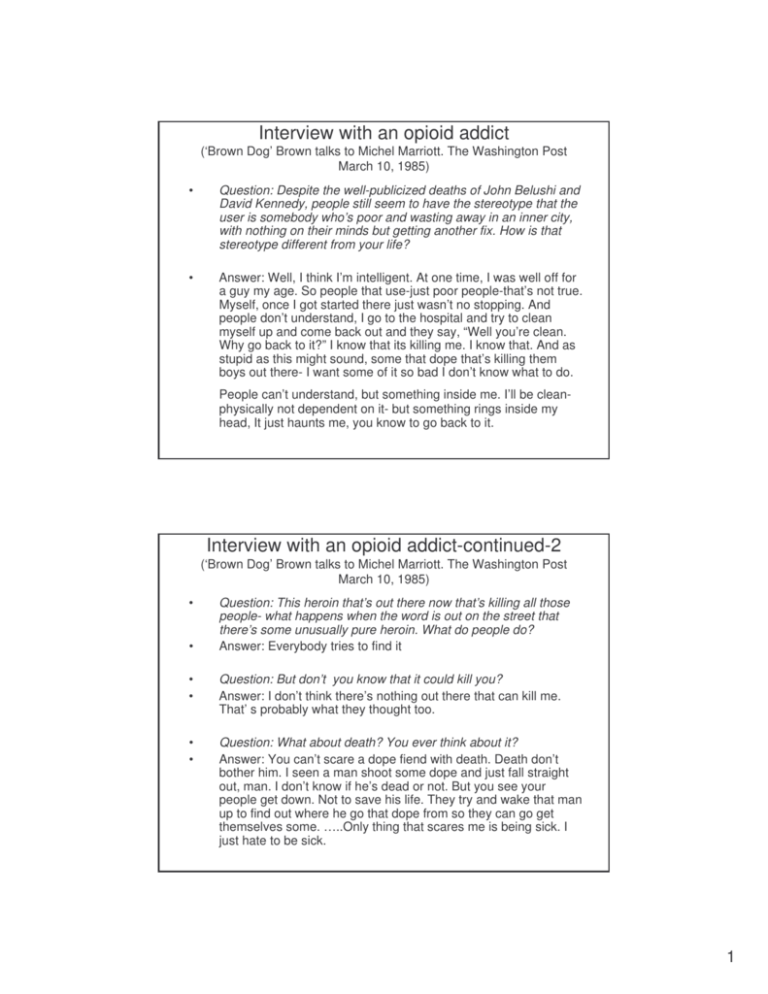
Interview with an opioid addict (‘Brown Dog’ Brown talks to Michel Marriott. The Washington Post March 10, 1985) • Question: Despite the well-publicized deaths of John Belushi and David Kennedy, people still seem to have the stereotype that the user is somebody who’s poor and wasting away in an inner city, with nothing on their minds but getting another fix. How is that stereotype different from your life? • Answer: Well, I think I’m intelligent. At one time, I was well off for a guy my age. So people that use-just poor people-that’s not true. Myself, once I got started there just wasn’t no stopping. And people don’t understand, I go to the hospital and try to clean myself up and come back out and they say, “Well you’re clean. Why go back to it?” I know that its killing me. I know that. And as stupid as this might sound, some that dope that’s killing them boys out there- I want some of it so bad I don’t know what to do. People can’t understand, but something inside me. I’ll be cleanphysically not dependent on it- but something rings inside my head, It just haunts me, you know to go back to it. Interview with an opioid addict-continued-2 (‘Brown Dog’ Brown talks to Michel Marriott. The Washington Post March 10, 1985) • • Question: This heroin that’s out there now that’s killing all those people- what happens when the word is out on the street that there’s some unusually pure heroin. What do people do? Answer: Everybody tries to find it • • Question: But don’t you know that it could kill you? Answer: I don’t think there’s nothing out there that can kill me. That’ s probably what they thought too. • • Question: What about death? You ever think about it? Answer: You can’t scare a dope fiend with death. Death don’t bother him. I seen a man shoot some dope and just fall straight out, man. I don’t know if he’s dead or not. But you see your people get down. Not to save his life. They try and wake that man up to find out where he go that dope from so they can go get themselves some. …..Only thing that scares me is being sick. I just hate to be sick. 1 Interview with an opioid addict-continued-3 (‘Brown Dog’ Brown talks to Michel Marriott. The Washington Post March 10, 1985) • • Question: Sick you mean you need to get high? Answer: U-huh. And I think about it a lot, man. My stomach bothers me a little bit and my nose start running. All of a suddent, I can’t take that. I got to run out and get a bag of dope. If I didn’t know what would make me feel better, then I could handle that. I could work and be sick. But I know that a bag of dope will make me feel better so I ups and go do it. Do something stupid. • Question: But you have no illusions about it. You really consider yourself hooked. You’re an addict? Answer: I’m an addict. I’m an addict • • • Question: Well what does that mean? Is there any such thing as recreational heroin use? Somebody who can just use it when they want it? Answer: I know people that use it , like once a week. They say they are not hooked but, you know, I did the same thing. Then after awhile, a couple of times a week. Before you know it, you’re hooked Interview with an opioid addict-continued-4 (‘Brown Dog’ Brown talks to Michel Marriott. The Washington Post March 10, 1985) • Question: No one has ever really described it well enough where I can even begin to understand what these highs hold. Why is it you know, the ultimate high? You take a chance with something that you say is killing yourself. What is it that is so good about it? • Answer: All I know is that it’s better than sex. I’ve passed up sex to get a shot of dope. That’s they only way I can describe it, man. It’s just good man. It relaxes you. It give me a feeling like I don’t give a damn. If the bills get paid, they get paid. If they don’t, then they don’t. I just do what I can and if that ain’t good enough-later for it. If I didn’t have a shot of dope, I would worry about the bills. I would would worry about my old lady leaving me. I’d worry about stuff like that. But give me a shot of dope and I don’t even worry about none of that stuff. 2 Case history of an opioid chipper (American Journal of Psychiatry, 1976, 133: 38) • Case 2. Dr. B. , a 58 year old male physician, has a successful general practice and no family history of alcoholism or drug dependency. He has been married for 31 years and has two grown children and one grandchild. His record in college and medical school was moderately good, and after a 1 year assistant residency in medicine he established a private practice in his current location. • Until he was 33 years old Dr. B’s only drug use was moderate consumption of alcohol that continues. At that point, he had been in practice for 5 years and had begun the first of a series of extramarital affairs. He was extremely tense and on impulse administered 15 mg of morphine intramuscularly to himself. The result was considerable relaxation and a feeling of well-being. After 1 year Dr. B. was using 15 mg of morphine intramuscularly 4 times a day, except on weekends and during vacations. Recently, more stringent federal regulations and increased surveillance of prescriptions for morphine have frightened him into intermittently reducing his use. At times on weekends and the first day or two of vacations he experiences some stomach discomfort, weakness, and sweating, but he has never had a full fledged withdrawal syndrome or an marked constipation. He believes his wife and current mistress are unaware of his habit. Case history of an opioid chipper-continued-2 (American Journal of Psychiatry, 1976, 133: 38) • Following the breakup of one of his affairs 11 years ago, he became depressed and briefly consulted a psychiatrist. During those interviews he mentioned his drug use almost as an afterthought. His depression lifted after he began a new affair, and he has felt reasonably comfortable ever since. His chief anxiety at the moment is the increasingly strict regulation of narcotics, about which he is very bitter. He feels that morphine “has been a good friend,” and he resents the lack of official and medical understanding that drug use such as his could be very helpful to many people. 3 Case history of conditioned withdrawal ( O’Brien, C. P.,Pharmacological Reviews, 1976, 27: 533) • The patient ws a 28 year old man with a 10 year history of narcotic addiction. He was married and the father of two children. He reported that, while addicted, he was arrested and incarcerated for 6 months. He reported experiencing sever withdrawal during the first 4 or 5 days in custody, but later, he began to feel well. He gained weight, felt like a new man, and decided that he was finished with drugs. He thought about his children and looked forward to returning to his former job. On the way home after release from prison, he began thinking about drugs and feeling nauseated. As the subway approached his stop, he began sweating, tearing from his eyes and gagging. This was an area where he he had frequently experienced narcotic withdrawal symptoms while trying to acquire drugs. As he got off the subway, he vomited onto the tracks. He soon bought drugs, and was relieved. The following day he again experienced craving and withdrawal symptoms in his neighborhood, and again relieved them by injecting heroin. The cycle repeated itself over the next few days and soon he became readdicted. 4
